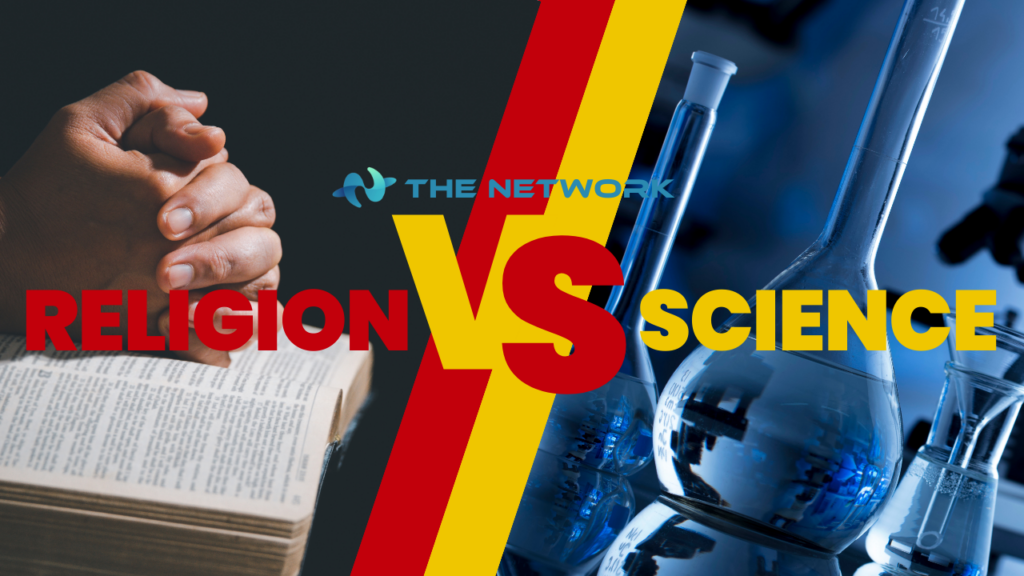Religion versus Science: Understanding the World Around Us

In the grand tapestry of human understanding, two fundamental forces have vied for dominance in explaining the mysteries of existence: religion and science. At their core, both seek to elucidate the world around us, yet they often do so through different lenses, methodologies, and beliefs. In this exploration, we’ll delve into the realms of religion and science, dissecting their perspectives on creation, the supernatural, and the unknown.
Defining the World: Perspectives of Religion and Science
Religion offers a lens through which adherents perceive the world, emphasizing faith, tradition, and divine revelation. It provides a framework for understanding existence, morality, and humanity’s purpose. Conversely, science relies on observation, experimentation, and empirical evidence to unravel the mysteries of the cosmos. It seeks natural explanations for phenomena and continually refines its understanding through the scientific method.
While science and technology have made remarkable strides in explaining the natural world, they sometimes face limitations when tackling the supernatural and unknown. Phenomena beyond empirical observation, such as consciousness, the afterlife, or the existence of a higher power, pose challenges to scientific inquiry.
Religion, on the other hand, offers explanations rooted in faith and divine revelation. Concepts like miracles, divine intervention, and the existence of a transcendent deity often transcend empirical verification, relying instead on personal belief and spiritual experience.
Creation Narratives: Big Bang versus Divine Creation
One of the most contentious debates between religion and science centers on the origin of the universe. The Big Bang theory, supported by substantial empirical evidence, posits that the cosmos began from a singular, infinitely dense point approximately 13.8 billion years ago. This scientific model outlines the expansion of space, the formation of galaxies, and the emergence of stars and planets.
In contrast, religious narratives, such as the creation account in the Book of Genesis, attribute the origin of the universe to divine agency. According to this biblical story, God spoke the world into existence over the course of six days, culminating in the creation of humanity.
The tension between these perspectives raises profound questions about the nature of reality, the role of faith, and the compatibility of science and religion.
Evolution versus Creationism: Bridging the Gap
Another flashpoint in the religion-science dialogue revolves around human origins. The theory of evolution, supported by overwhelming scientific evidence, describes the gradual process by which species diversify and adapt over time through natural selection.
Conversely, creationist beliefs assert that humans and other species were created in their present form by a divine Creator, as described in religious texts. This perspective often rejects evolutionary theory or seeks to reconcile it with religious teachings through frameworks like Intelligent Design.
The debate surrounding evolution versus creationism underscores broader discussions about education, religious freedom, and the boundaries between science and belief.
Science and the Supernatural
Science primarily deals with the natural world and phenomena that can be observed, measured, and tested. While it may not directly address the supernatural, it often seeks to explain purported supernatural occurrences through naturalistic explanations. Concepts like ghosts, miracles, and psychic phenomena are often approached skeptically by the scientific community, with explanations rooted in psychology, physics, or biology.
Religion and the Supernatural
Religion, on the other hand, embraces the supernatural as an integral part of faith and spirituality. Believers often attribute miraculous events, divine interventions, and spiritual experiences to the workings of a higher power or deity. Religious rituals, prayers, and ceremonies are often seen as conduits for divine communication and intervention in the natural world.
Do Scientists believe in God?
Contrary to popular misconceptions, scientists encompass a diverse range of beliefs, including atheism, agnosticism, and various religious affiliations. While some scientists maintain faith in a higher power, others adhere strictly to empirical evidence and naturalistic explanations.
The intersection of science and faith prompts introspection and dialogue, challenging individuals to reconcile their understanding of the natural world with their spiritual convictions.
The Importance of Religion in Society
Religion plays a multifaceted role in society, shaping cultural norms, moral frameworks, and communal identities. It provides solace, guidance, and a sense of belonging to millions worldwide. Moreover, religious institutions often serve as catalysts for charitable endeavors, social justice initiatives, and community cohesion.
Despite its significance, religion also sparks debates about ethics, dogma, and its influence on governance, highlighting the complexities inherent in navigating faith in a pluralistic society.
What Should I Believe In?
In navigating the interplay between religion and science, individuals often grapple with existential questions about meaning, purpose, and ultimate truth. While some find solace in religious faith, others derive meaning from scientific inquiry, philosophy, or personal experience.
Ultimately, the quest for understanding transcends simple dichotomies, inviting individuals to explore the depths of their beliefs and engage in dialogue with others
.
School or Homeschool Learning Ideas
- Comparative Analysis: Encourage students to explore creation narratives across different religious traditions, comparing and contrasting their perspectives on origins.
- Scientific Inquiry: Facilitate experiments or research projects that delve into scientific phenomena, encouraging students to apply the scientific method to real-world scenarios.
- Debate and Dialogue: Organize classroom debates or discussions on topics like evolution versus creationism, fostering critical thinking and respectful discourse.
- Field Trips: Arrange visits to museums, observatories, or religious institutions, providing students with firsthand exposure to scientific discoveries and cultural practices.
- Ethical Dilemmas: Present students with ethical dilemmas that intersect with religion and science, prompting them to reflect on their values and decision-making processes.
What Our Children Need to Know
- Ethical Decision Making: Discuss scenarios where scientific advancements clash with religious beliefs, prompting children to consider the ethical implications of emerging technologies.
- Cultural Literacy: Expose children to diverse religious traditions and scientific concepts, fostering empathy, tolerance, and a broader understanding of the world.
- Critical Thinking: Equip children with the skills to critically evaluate information, discerning between scientific consensus, religious doctrine, and personal belief.
- Interdisciplinary Learning: Encourage children to explore interdisciplinary connections between science, religion, history, and philosophy, recognizing the interconnectedness of human knowledge.
The Big Questions
- Can science and religion coexist harmoniously, or are they inherently incompatible?
- How do personal beliefs shape our understanding of the natural world, morality, and purpose?
- What role should faith play in scientific inquiry, education, and public discourse?
- How do societal attitudes towards religion and science impact individual freedoms, rights, and responsibilities?
- In what ways can dialogue and mutual respect foster greater understanding and cooperation between religious and scientific communities?
Conclusion
The dichotomy between religion and science reflects humanity’s ongoing quest for understanding and meaning. While each offers distinct perspectives on the cosmos, they intersect and diverge in complex ways, shaping individual beliefs, societal norms, and the trajectory of human progress. By embracing curiosity, empathy, and dialogue, we can navigate the terrain of belief with humility and open-mindedness, forging pathways to deeper understanding and shared wisdom.





The interplay between religion and science is a topic that’s always fascinated me. It seems like there’s a constant tension between the two, yet they both offer valuable insights into the mysteries of existence.
Religion and science approach understanding the world around us from different angles, yet they often intersect in profound ways. While science relies on empirical evidence and observation, religion delves into matters of faith, spirituality, and the supernatural.
The article mentions the debate surrounding creation narratives. As someone deeply involved in space exploration, how do you reconcile scientific theories like the Big Bang with religious beliefs about divine creation?
It’s a question that many grapple with, Elon. While scientific explanations like the Big Bang provide a compelling framework for understanding the origin of the universe, religious narratives offer a different perspective rooted in faith and tradition. For some, reconciling these viewpoints requires a nuanced understanding that respects both scientific inquiry and spiritual convictions.
And what about evolution versus creationism? As we strive for technological advancement, how do we navigate the complexities of this debate?
Evolutionary theory has provided profound insights into the diversity of life on Earth, Elon. However, the intersection of science and religion in discussions about human origins often raises contentious issues. It’s crucial for society to foster dialogue and understanding, recognizing that individuals may approach these topics from diverse perspectives shaped by their beliefs and cultural backgrounds.
The article also touches on the importance of religion in society. How do you see the role of faith intersecting with scientific progress in shaping our collective future?
Religion has played a significant role in shaping human history, culture, and ethics, Elon. While science drives technological innovation and our understanding of the natural world, religion often provides moral guidance, communal support, and a sense of purpose. As we navigate the complexities of the modern world, it’s essential to recognize the contributions of both religion and science in shaping society and advancing human flourishing.
It’s clear that these discussions have real-world implications for how we approach education, ethics, and societal development. How do you think we can foster greater understanding and cooperation between religious and scientific communities?
Mutual respect, empathy, and open dialogue are essential, Elon. By acknowledging the diverse perspectives that individuals bring to these discussions, we can create spaces for meaningful engagement and collaboration. Education also plays a crucial role in promoting critical thinking, cultural literacy, and interdisciplinary learning, fostering a deeper appreciation for the complexities of human knowledge and belief.